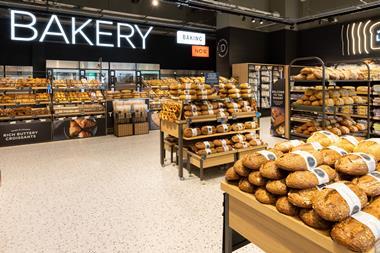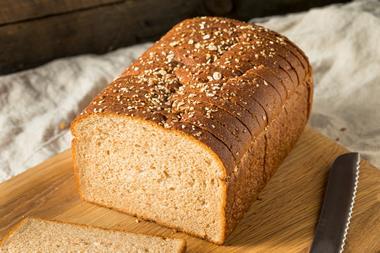The report today on sugar and carbohydrates has prompted a raft of mixed reactions - from supporters to those who feel the targets will be difficult to attain. Here British Baker compiles those comments:
Gordon Polson, director of the Federation of Bakers:
“The government’s Scientific Advisory Committee on Nutrition (SACN) report on carbohydrates and health which launches today highlights the significant role carbohydrates plays in a healthy balanced diet. It states the dietary reference value for total carbohydrates is being maintained at 50% of total dietary energy.
“It also points to the benefits of increased dietary fibre in the diet, with the dietary reference value for adults being 30g per day, which is an increase from the existing recommendation of 23-24g per day. Amongst other things, diets rich in dietary fibre are associated with a lower incidence of long term conditions such as cardio-metabolic disease, and colon and rectal cancers.
“Both wholemeal and white bread are significant sources of carbohydrates and dietary fibre in the UK. Bread, provides nearly as much dietary fibre as vegetables, with around half of this coming from white bread – an average slice contains 0.7g of fibre. It is therefore increasingly important consumers understand the significant contribution bread can make to a healthy balanced diet.”
Ian Wright, director general of the Food and Drink Federation (FDF):
“The most thorough scientific review of carbohydrates and health carried out in recent years should leave people in no doubt that sugars can be enjoyed safely as part of a varied and balanced diet. Sensationalist commentaries on this everyday ingredient that are not based in science should now be relegated to the past. Demonising any one ingredient in the obesity debate isn’t helpful.
“The report confirms what we already know - that sugars are a contributing factor to tooth decay and if consumed in excess can lead to weight gain.
“Companies’ ongoing work to lower calories in foods and drinks, including reducing sugars, and to offer a range of portion sizes and low and zero calorie options, supports this ambition. Food and drink producers have been fortifying products with added fibre for years.
“To meet the stretching dietary goals that SACN recommends will mean changes to the way people eat. Published diet modelling shows that people can reduce free sugars and boost fibre in the diet in a number of ways while still fitting in the foods and drink they enjoy. We hope SACN’s key recommendations will be translated into meaningful and practical diet and lifestyle messages which are consistently used by everyone in the health debate.”
Judith Buttriss, director general, British Nutrition Foundation:
“The sugar recommendation is achievable, but it will require changes in dietary patterns for most people. 1 in 8 UK adults currently consumes 5% or less of their calorie intake as free sugars.
“Since the last review over 15 years ago, the evidence on the health effects of fibre has strengthened and also broadened – it’s no longer just about preventing constipation, there is now evidence of benefits in relation to cardiovascular disease, type 2 diabetes and bowel cancer. The new target (of 30g for adults) will be challenging as current intakes average about 18g in adults. To achieve this new level of intake, fibre-containing foods need to be eaten at all meal occasions, including snacks (see the modelling of sample menus published on our website). The main dietary sources of fibre are wholegrain/wholemeal cereal-based foods, potatoes eaten with the skin and vegetables.
“Bread, particularly wholemeal/wholegrain, provides fibre and to be classed as a good source needs to have at least 6g/100g.
“The sugars used in baking fall under the ‘free sugars’ category. Current average intakes of free sugars are 2-3 fold above the new 5% energy recommendation in all age/sex groups of the population. Bakery products (cakes, buns, biscuits etc.) are a significant source of intakes – 15% of the total in adults.”
Mike Holling, executive director of the Craft Bakers’ Association:
“On to many occasions bread is given a negative press, we have known for some time that this report was to be published, I do not believe further tax action will work, but I am sure many bakers will review their offering to the consumer. The craft baking industry worked hard to achieve salt reduction targets that challenge us in previous years.
"Moderation by the individual will be the key success to this government strategy in reducing the sugar intake. Improve life style messages are required instead of concentrating on just one ingredient.”
Mike Bagshaw, chairman of the British Society of Baking:
"The SACN report is not good for bakery, but I think we have known the perils of sugar for a long time, I think the cake / confectionery people will be hit hardest.
"Also, I think bakery needs to move legislation on sweetners along because Stevia is not permitted in cakes.
"Also sugar has such a functional role in bakery products so I think it is a real challenge to take it out, we have managed to remove 50% sugar in American style cookies recently."
Evidence
Dr Fiona McCullough, chairman of the British Dietetic Association:
“We have known for a number of years, and further evidence presented, shows that as a nation, we are consuming too much sugar. The time is now right to address this issue head on and improve the nation’s health in both the long and short term. I also welcome the need to increase fibre in the nation’s diet.
“Let’s make no mistake that the recommendations sitting on the desk of the government will be challenging to deliver, but I can assure you that dietitians around the UK are up for this challenge. Indeed, the profession has been at the forefront of many of the issues raised, such as adopting a policy in favour of taxing sugary fizzy drinks two years ago.
“The experts have presented credible evidence and the ball is now firmly in the Government’s court to seize this opportunity to improve the nation’s health. While we all have a personal role to play in our individual health and the health of our families, we do need political will and momentum behind this. ”
Katharine Teague, head of advocacy at AB Sugar:
“We welcome the work of SACN and the experts who have contributed to the guidelines. However, we are concerned at the true value of the guidelines. It is important to remember, there is no silver bullet when it comes to tackling obesity and whilst helping people to be more aware of the calories they are consuming – whether through sugars or other types of ingredients - is important, we would urge policy-makers to be mindful of the unintended consequences of focusing on one type of ingredient in isolation.
“For this reason, we suggest a holistic approach needs to be taken, one that includes a mixture of educational and regulatory measures. While it is up to the government to decide how to implement today’s recommendations, we suggest that a cross-departmental taskforce be explored in order to tackle the complex issue of obesity. We would urge policy-makers to further consider how this may work in practice to bring about a more integrated approach across government in tackling obesity.
“What’s required is collaborative action to find real and workable solutions to the obesity crisis. We are committed to playing our part.”
Have your say: What do you think? Let us know at lesley.foottit@wrbm.com or tweet us at @BritishBaker.
































No comments yet